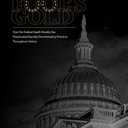Recent attention on the federal death penalty is highlighting the diverse opinions of victims’ families who have lost loved ones to violence. Like Americans from all walks of life, victims’ families hold a diverse set of views on capital punishment, shaped by their individual faith, political views, and personal reaction to being impacted by crime.
Some support the death penalty, and others oppose it. Some victims’ family members are part of organizations like Murder Victims’ Families for Human Rights, which uses “public education, advocacy, and organizing” to “amplify the voices of victims’ families who oppose the death penalty and provide anti-death penalty campaigns with victims’ uniquely compelling testimony.”
In 2019, as the first Trump administration prepared to resume federal executions after a 16-year hiatus, Earlene Branch Peterson issued a public plea for President Donald Trump to grant clemency for Daniel Lewis Lee, who was on death row for the murder of Ms. Peterson’s daughter, son-in-law, and granddaughter. “Yes, Daniel Lee damaged my life, but I can’t believe taking his life is going to change any of that. I can’t see how executing Daniel Lee will honor my daughter in any way. In fact, it’s kind of like it dirties her name, because she wouldn’t want it and I don’t want it. That’s not the way it should be. That’s not the God I serve,” Ms. Peterson said.
Mr. Lee was executed on July 14, 2020, during the height of the COVID-19 pandemic. “We have spoken out that this is not something we wanted,” said Monica Veillette, a cousin and niece of the victims. “Over and over it’s been said that it’s being done for my aunt and cousin, it’s being done for our family. And in the end, they completely dismissed us.”
Rev. Sharon Risher, whose mother and two cousins were killed in the mass shooting at Charleston’s Emanuel AME Church, has become an outspoken advocate against capital punishment. Though President Biden commuted 37 federal death sentences, he left three people on death row, including Dylann Roof, who was convicted of the Charleston church shooting. Rev. Risher said she supported clemency for Mr. Roof. “I need the President to understand that when you put a killer on death row, you also put their victims’ families in limbo with the false promise that we must wait until there is an execution before we can begin to heal,” she said in a statement in December 2024.
In some cases, individuals affected by the same crime disagree about the appropriate punishment. Daryl Lawrence was sentenced to death for killing Columbus, Ohio police officer Bryan Hurst in 2005. He received clemency in 2024. Officer Hurst’s widow, Marissa Gibson, said in a statement to the Columbus Dispatch, “While this is truly distressing news on a personal level for my family, it also feels like a complete dismissal and undermining of the federal justice system.” Meanwhile, Officer Hurst’s police partner, Donnie Oliverio, supported clemency, saying, “Putting to death the person who killed my police partner and best friend would have brought me no peace. The President has done what is right here, and what is consistent with the faith he and I share.” In the case of Payton Gendron, who is facing a possible federal death sentence for killing 10 people at the Buffalo Tops supermarket, families are “split” on the appropriateness of a death sentence, according to attorney Terry Connors. Michelle Fryson, whose aunt and cousin were killed in the Buffalo shooting, said, “Never did I ever wish that he would have death penalty. Conversely, I was hoping that he would be able to take some time to process things for a very long time.”
Attorney General Pam Bondi has made repeated statements in support of President Trump’s agenda for increased use of the death penalty as a way of supporting victims families. But less than two weeks ago, the administration announced significant cuts to victims’ services organizations. “We’re shocked that an administration that claims to care about protecting victims would leave so many vulnerable Americans without access to an essential lifeline,” said Renée Williams, CEO of the National Center for Victims of Crime.
Jeffrey Collins and Ali Swenson, Relief, defiance, anger: Families and advocates react to Biden’s death row commutations, Associated Press, December 23, 2024; Bailey Gallion, Family, police react to Biden commuting death sentence for Ohio cop killer, Columbus Dispatch, December 23, 2024; Scott MacFarlane, Crime victims groups stripped of federal grant awards by Trump administration, CBS News, April 24, 2025; Ryan Whalen, Buffalo shooting victims’ families have mixed feelings on DOJ seeking death penalty, Spectrum News 1, January 12, 2024.



